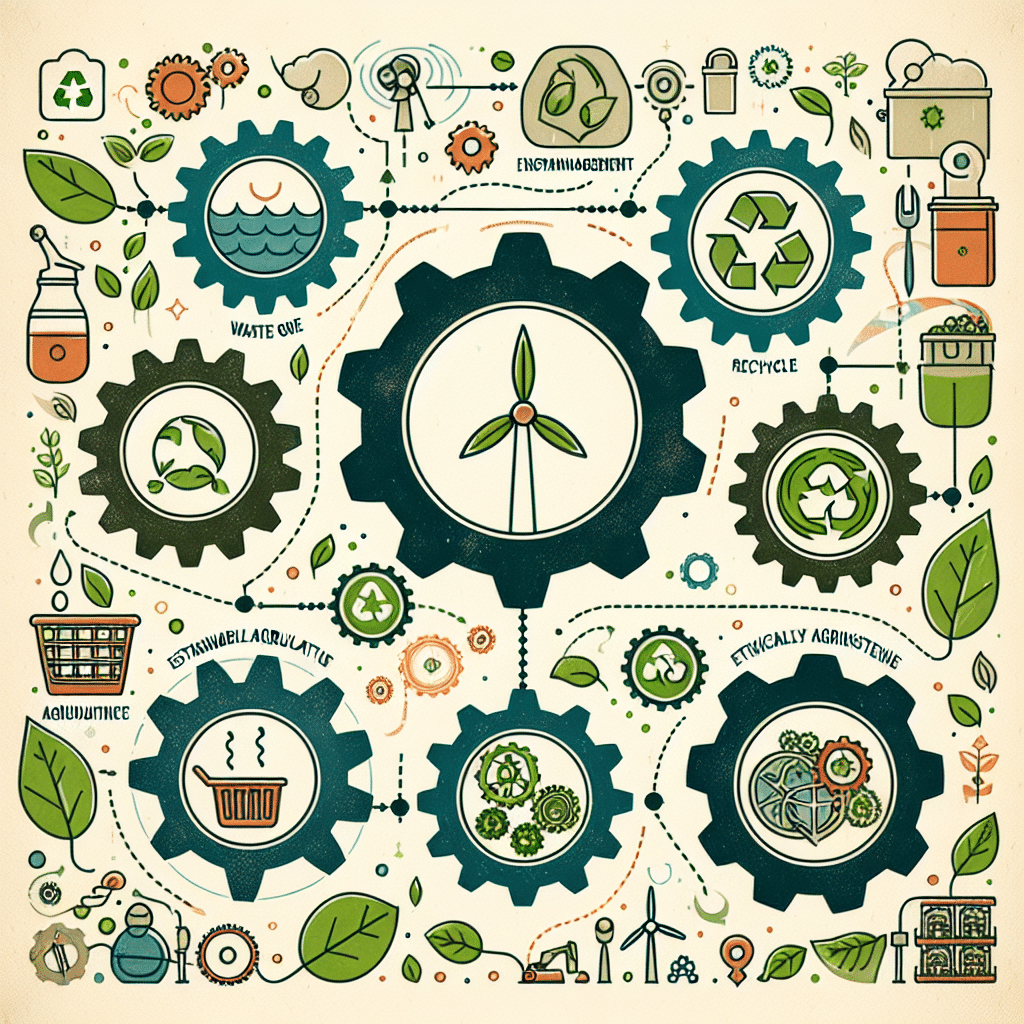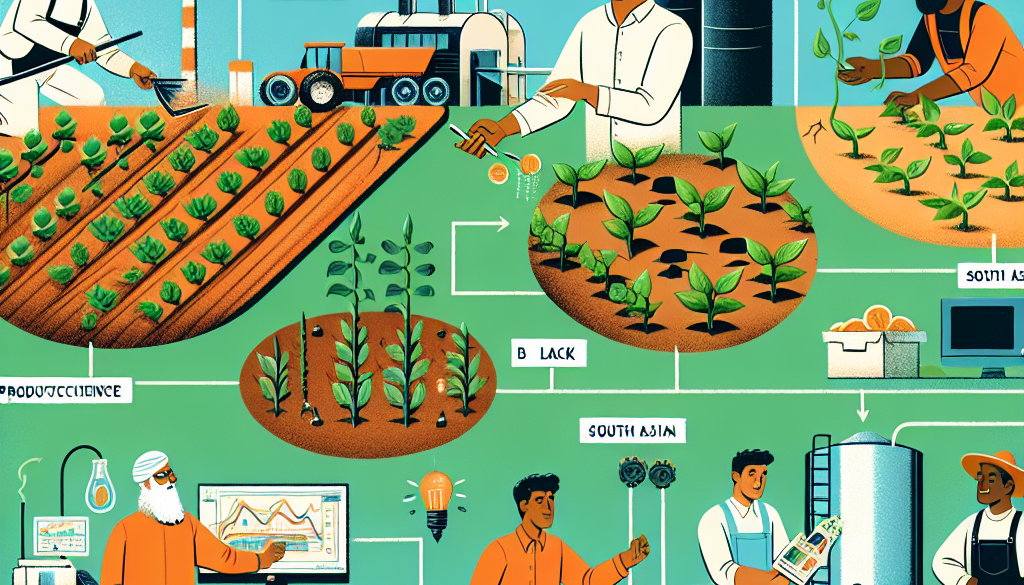How Can Food Manufacturing Practices Ensure Sustainable Food Systems?
-
Table of Contents
- Sustainable Food Manufacturing: Ensuring a Greener Future
- Understanding the Impact of Food Manufacturing
- Key Strategies for Sustainable Food Manufacturing
- Resource Efficiency: Doing More with Less
- Waste Reduction: A Circular Approach to Food Manufacturing
- Renewable Energy: Powering the Future of Food Manufacturing
- Sustainable Sourcing: The Foundation of a Sustainable Food System
- Green Packaging: Reducing the Environmental Footprint
- Conclusion: The Path Forward for Food Manufacturing
- ETprotein: Leading the Way in Sustainable Protein Products
Sustainable Food Manufacturing: Ensuring a Greener Future

The global food system is at a crossroads. With the world’s population projected to reach nearly 10 billion by 2050, the demand for food will increase substantially. However, current food manufacturing practices often lead to environmental degradation, resource depletion, and climate change. To address these challenges, the food industry must adopt sustainable practices that ensure the longevity and health of our food systems. This article explores how food manufacturing can contribute to sustainable food systems, with a focus on innovative practices, waste reduction, and resource efficiency.
Understanding the Impact of Food Manufacturing
Food manufacturing is a complex process that involves the transformation of raw ingredients into finished products. It is a critical component of the food supply chain, but it can also be a significant source of environmental impact. The production of food contributes to greenhouse gas emissions, water consumption, and deforestation. To mitigate these impacts, manufacturers must adopt sustainable practices that prioritize the environment and resource conservation.
Key Strategies for Sustainable Food Manufacturing
- Resource Efficiency: Optimizing the use of water, energy, and raw materials can significantly reduce the environmental footprint of food manufacturing.
- Waste Reduction: Implementing strategies to minimize food waste during production can conserve resources and reduce greenhouse gas emissions.
- Renewable Energy: Transitioning to renewable energy sources, such as solar or wind power, can decrease reliance on fossil fuels and lower carbon emissions.
- Sustainable Sourcing: Choosing to source raw materials from suppliers that practice sustainable agriculture can promote biodiversity and soil health.
- Green Packaging: Developing eco-friendly packaging solutions can reduce waste and pollution.
Resource Efficiency: Doing More with Less
Resource efficiency is about using the Earth’s limited resources in a sustainable manner while minimizing impacts on the environment. Food manufacturers can achieve this by optimizing production processes, reducing energy consumption, and conserving water. For instance, using energy-efficient machinery and adopting practices like heat recovery can significantly cut down energy use. Water recycling systems can also be implemented to treat and reuse water within the facility, reducing the overall water footprint.
Waste Reduction: A Circular Approach to Food Manufacturing
Food waste is a major issue within the food manufacturing industry. It is estimated that around one-third of all food produced globally is lost or wasted. To combat this, manufacturers can adopt a circular economy approach, where waste materials are repurposed or recycled back into the production cycle. This can include using food by-products as animal feed or converting organic waste into bioenergy through anaerobic digestion.
Renewable Energy: Powering the Future of Food Manufacturing
Renewable energy sources are essential for reducing the carbon footprint of food manufacturing. By investing in solar panels, wind turbines, or biomass energy systems, food manufacturers can decrease their reliance on fossil fuels. This not only reduces greenhouse gas emissions but can also lead to long-term cost savings as renewable energy becomes more affordable.
Sustainable Sourcing: The Foundation of a Sustainable Food System
The sustainability of food manufacturing is heavily influenced by the sourcing of raw materials. By choosing suppliers that adhere to sustainable farming practices, manufacturers can ensure that their products are contributing to a healthier ecosystem. This includes supporting local farmers, promoting fair trade, and ensuring that crops are grown without harmful pesticides or excessive water use.
Green Packaging: Reducing the Environmental Footprint
Packaging plays a significant role in the sustainability of food products. Developing packaging that is recyclable, biodegradable, or made from renewable materials can greatly reduce the environmental impact. Additionally, reducing packaging size and weight can lead to lower transportation emissions and less waste.
Conclusion: The Path Forward for Food Manufacturing
To ensure sustainable food systems, food manufacturers must embrace innovative practices that prioritize the environment and resource conservation. By focusing on resource efficiency, waste reduction, renewable energy, sustainable sourcing, and green packaging, the food industry can make significant strides towards sustainability. These practices not only benefit the planet but also offer economic advantages through cost savings and improved brand reputation.
As consumers become increasingly aware of the environmental impact of their food choices, manufacturers that adopt sustainable practices will be well-positioned to meet market demands. The transition to sustainable food manufacturing is not just an environmental imperative but also a business opportunity.
ETprotein: Leading the Way in Sustainable Protein Products
ETprotein is at the forefront of providing sustainable protein solutions that align with the principles of sustainable food manufacturing. Their range of organic bulk vegan proteins and L-(+)-Ergothioneine (EGT) products are non-GMO, allergen-free, and characterized by a neutral taste. By choosing ETprotein’s high-quality protein products, manufacturers can ensure that their offerings are not only nutritious but also environmentally responsible.
For those in the food and beverage industry looking to enhance their products with sustainable protein options, ETprotein’s expertise and commitment to quality make them an ideal partner. Their products cater to a diverse range of industries, ensuring that businesses can find the right protein solutions to meet their needs while supporting sustainable food systems.
About ETprotein:
ETprotein, a reputable protein and L-(+)-Ergothioneine (EGT) Chinese factory manufacturer and supplier, is renowned for producing, stocking, exporting, and delivering the highest quality organic bulk vegan proteins and L-(+)-Ergothioneine. They include Organic rice protein, clear rice protein, pea protein, clear pea protein, watermelon seed protein, pumpkin seed protein, sunflower seed protein, mung bean protein, peanut protein, and L-(+)-Ergothioneine EGT Pharmaceutical grade, L-(+)-Ergothioneine EGT food grade, L-(+)-Ergothioneine EGT cosmetic grade, L-(+)-Ergothioneine EGT reference grade and L-(+)-Ergothioneine EGT standard. Their offerings, characterized by a neutral taste, non-GMO, allergen-free attributes, with L-(+)-Ergothioneine purity over 98%, 99%, cater to a diverse range of industries. They serve nutraceutical, pharmaceutical, cosmeceutical, veterinary, as well as food and beverage finished product distributors, traders, and manufacturers across Europe, USA, Canada, Australia, Thailand, Japan, Korea, Brazil, and Chile, among others.
ETprotein specialization includes exporting and delivering tailor-made protein powder and finished nutritional supplements. Their extensive product range covers sectors like Food and Beverage, Sports Nutrition, Weight Management, Dietary Supplements, Health and Wellness Products, and Infant Formula, ensuring comprehensive solutions to meet all your protein needs.
As a trusted company by leading global food and beverage brands and Fortune 500 companies, ETprotein reinforces China’s reputation in the global arena. For more information or to sample their products, please contact them and email sales(at)ETprotein.com today.












